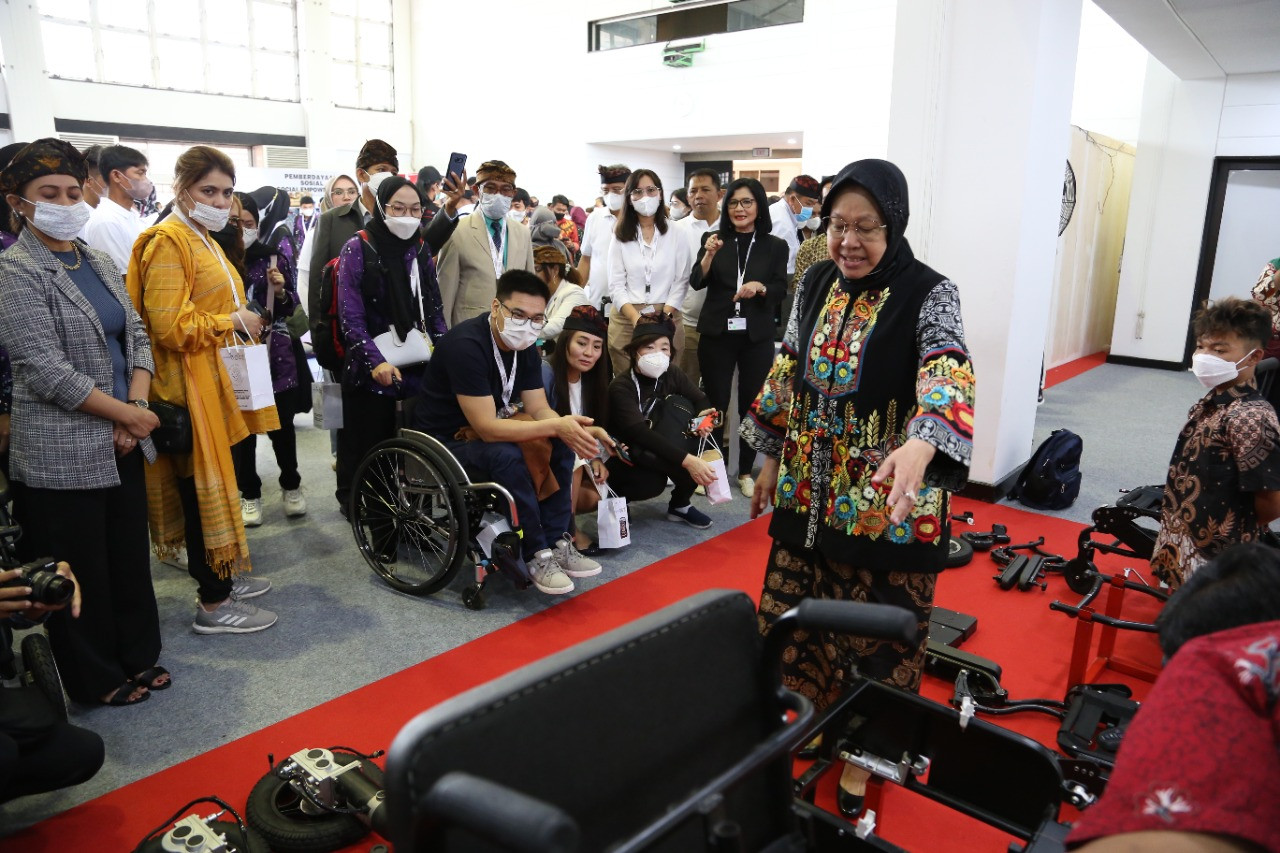Popular Reads
Top Results
Can't find what you're looking for?
View all search resultsPopular Reads
Top Results
Can't find what you're looking for?
View all search resultsHigh-level meeting: Asia Pacific witnesses Indonesia's success and achievements
Social Affairs Minister Tri Rismaharini expressed her pride and honor at the implementation of the High-level Intergovernmental Meeting on the Final Review of the Asian and Pacific Decade of Persons with Disabilities (HLIGM-FRPD).
Change text size
Gift Premium Articles
to Anyone
 Social Affairs Minister Tri Rismaharini (center right, on stage) presents an adaptive wheelchair for people with cerebral palsy during a visit to the Inten Soeweno Integrated Center on the sidelines of the High-Level Intergovernmental Meeting on the Final Review of the Asian and Pacific Decade of Persons with Disabilities (HLIGM-FRPD) in Jakarta on Oct. 19-21.
Social Affairs Minister Tri Rismaharini (center right, on stage) presents an adaptive wheelchair for people with cerebral palsy during a visit to the Inten Soeweno Integrated Center on the sidelines of the High-Level Intergovernmental Meeting on the Final Review of the Asian and Pacific Decade of Persons with Disabilities (HLIGM-FRPD) in Jakarta on Oct. 19-21.
S
ocial Affairs Minister Tri Rismaharini expressed her pride and honor at the implementation of the High-level Intergovernmental Meeting on the Final Review of the Asian and Pacific Decade of Persons with Disabilities (HLIGM-FRPD). The meeting agreed on a common consensus, referred to as the Jakarta Declaration.
At the end of the meeting on Friday (21/10), Risma delivered the substance of the Jakarta Declaration, which calls on the global community to promote, protect and ensure the fulfillment of human rights and fundamental freedoms and respect for the dignity of persons with disabilities. For this reason, the Jakarta Declaration also encourages member states to synchronize national legislation.
Risma said it was an honor and pride for Indonesia to be part of this meaningful and successful conference. "Through the Jakarta Declaration, we once again affirm our global commitment to a better life for all people with disabilities," she said.
She stated that member states had made progress, but in line with this, it was necessary to increase sensitivity toward disabilities in the coming decade. "Concrete steps need to be taken to guarantee [people with disabilities’] rights to be listened to and represented, as well as to increase their representation in government and policymaking," she said.
To ensure that the Jakarta Declaration ran as expected, the Economic and Social Commission for Asia and the Pacific (ESCAP) countries need to raise awareness of disability rights, eliminate physical barriers, information and stigma and discrimination through increasing affirmations in all public sectors, running campaigns and increasing the capacity of institutions across all sectors.
Equally important is accelerating multiplatform, multi-governmental and multi-sectoral development that includes concrete activities and investments in education, entrepreneurship and employment, assistance technology, rehabilitation, disability data, expansion of social protection systems and accessible health.
Risma emphasized that the Jakarta Declaration would be a reference in fulfilling the rights and protection of persons with disabilities over the next decade. The Jakarta Declaration is expected to reaffirm the commitment of Asia-Pacific countries in realizing the Incheon Strategy initiated 10 years ago.
The three-day event was lively, but full of wisdom. The excitement began during the opening on Wednesday (19/10). The delegation was treated to a Renjang Dewa dance performance from Bali, which was performed by eight people with disabilities. This was continued with a performance of Javanese song "Ojo Dibandingke" by Ardha Krisna Pratama. These two acts received a long applause from the delegates present.
On the second day, delegates attended a gala dinner at the Social Affairs Ministry. Here, they watched 105 people with disabilities perform various dances and music from different regions. These were performed by artists with speech, intellectual, sight and hearing disabilities, as well as mental health and psychiatric disorders.
"Unexpectedly, it turned out to be so good. They performed very well. I’m not sure that non-disabled people could collaborate that well," the social affairs minister said. Between floodlights and musical accompaniment each group of dancers took turns to fill the stage.
On the last day, the ministry invited delegates to witness the innovations made by people with disabilities in the forms of tools and entrepreneurial products to support their needs. Some products on show included adaptive wands, water sensors, electric wheelchairs, adaptive wheelchairs and three-wheeled motors.
"The adaptive wheelchair for cerebral palsy started with my dream of finding a way for [those living with the condition] to stand up and be able to do activities like non-disabled [people]," the social affairs minister said. This tool was tried by Undrakhbayar Chuluundavaa, a delegate from Mongolia.
"Thank you so much for letting me try this wheelchair. In Mongolia, we are also trying to develop this kind of technology. The wheelchair there is still not at this stage like in Indonesia," he said.









